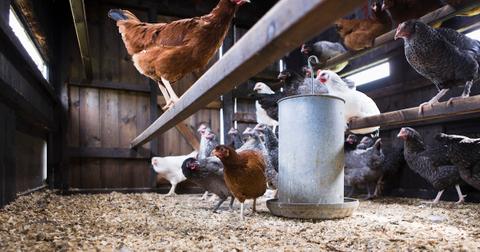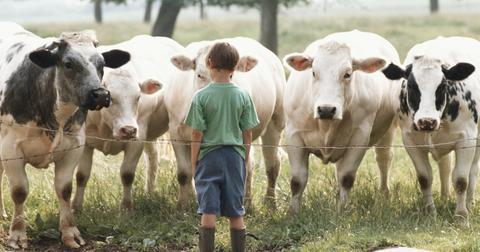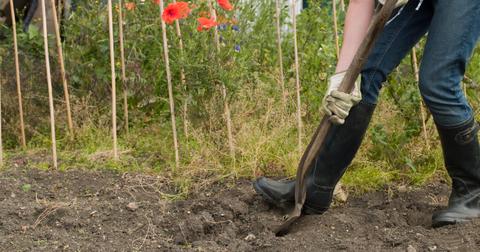For centuries, human beings have been using animal dung to fertilize their fields. It’s been so effective, in fact, that many farmers not only swear by it, they refuse to use anything else. While there is no denying manure's proven track record, modern understanding of decomposition and fertilization has shed some new light on these old techniques, and frankly, they’re s--t. As it turns out, the best manure for vegetable gardening might not be what everyone’s always believed it to be.
How does manure work?
Manure, like compost and other fertilizers, works by helping to improve soil quality and water capacity. It also contains a host of bacteria and microorganisms that provide nutrients to the soil. And regardless of the smell, all of these qualities prepare the soil to grow healthier, heartier plants. The thing is, manure isn’t great for everything.
Article continues below advertisement
According to the FDA, the jury is still out on whether or not manure should be used to grow food crops. This is especially true for root vegetables like carrots, onions, and potatoes, whose most delicious parts grow nestled in the soil amongst the uh... fertilizer in question. Manure may contain beneficial bacteria, but it also contains harmful bacteria like E. coli, which has caused quite a few food scares in recent years.

Article continues below advertisement
What is the best manure for vegetable gardening?
Opinions differ on the “best” manure for vegetable gardening. This is because Farmer X and Farmer Y have had different experiences using different types of manure and it’s entirely possible that both worked equally well. According to Countryside, however, the best manure for gardens is a blend of cow dung and properly composted manure, often referred to as “black gold.”
Countryside also recommends taking advantage of the different kinds of animals on a farm, and blending the assorted animal droppings into workable manure. Other websites like GrowVeg recommend “bunny berries,” otherwise known as rabbit droppings, which contain plant nutrients in low doses that will work to fertilize but not to overwhelm plant roots. Still, others recommend llama or alpaca “beans” which they say rot into a material similar to peat moss.
Article continues below advertisement
Farming experts swear by the droppings left by free-range chickens, which they recommend should be composted at fairly high temperatures before use. This is done to eliminate the harmful bacteria in the animal dung and make it safe to handle. The minds at Gardening Know How recommend using sheep manure, which composts quickly, is high in nitrogen, but low in other macronutrients. Horse manure, like cow manure, is potent but takes a very long time to compost.

Article continues below advertisement
Are there vegan manures?
Contrary to popular belief, manure doesn’t necessarily have to come from an animal. In fact, some of the best manures don’t actually come from animals at all. Just because animal manure is organic does not mean it’s the most ideal choice for gardening. These manures contain animal byproducts, as well as any chemicals or antibiotics the animals have eaten. And you don’t always want such things in your veggie garden.
There are several organic and vegan alternatives to these animal-based manures and they include plant-based compost, hay, seaweed, and green manure — a type of organic fertilizer that involves growing a plant or crop and then turning it back into the soil. This method is similar to no-till gardening, and it utilizes the existing plant matter, microbes, and soil to create a more effective, more natural fertilizer for your plants.
Article continues below advertisement
According to Vegan.org, the plants you grow to make green manure are left to break down in the soil, rather than picked or pulled, giving it extra organic matter and important nutrients across the seasons. These nutrients will help boost plant growth and ultimately promote better soil drainage and water retention. There are a number of popular plants that should be grown between growing seasons for this purpose, including annual ryegrass, clover, alfalfa, and winter wheat.

Article continues below advertisement
How to add manure to my garden:
We should reiterate, there is no “best” manure for your vegetable garden. There are many serviceable ones, but choosing what will work best for you depends on a number of factors. Your crops, property size, location, availability, and preference must all be taken into account. That said, there are some important things to note about adding manure to any home vegetable garden.
If you are using animal-based manure, you should allow it to compost fully, for at least six months or longer, before using it in your soil. You could add it raw and till it into the soil, but you should do this at least a full season ahead of planting as well. This will help avoid any nasty E. coli or other harmful bacteria from taking root in your roots. Other pathogens to watch out for with animal manure include Salmonella, Campylobacter bacteria, Giardia protozoa, and Cryptosporidium protozoa.
Any one of those pathogens will make you sick or worse, so to be completely safe, most experts recommend using organic compost that does not include manure for home gardens. Compost will often work just as well if not better for the purposes of a backyard vegetable garden than conventional or manure-based fertilizer. Even better, it can be made at home from your own kitchen scraps. That way, you know exactly what’s going into your fertilizer.
"vegetable" - Google News
January 07, 2021 at 11:24PM
https://ift.tt/3hSwutN
What Is the Best Manure for Vegetable Gardening? - Green Matters
"vegetable" - Google News
https://ift.tt/2CyIOeE
https://ift.tt/3aVzfVV
Bagikan Berita Ini














0 Response to "What Is the Best Manure for Vegetable Gardening? - Green Matters"
Post a Comment